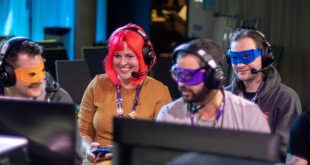Every month an industry leader wraps up MCV/DEVELOP with their unique insight. This month we talk to Brenda Romero, CEO and managing director of Romero Games.
Starting out as a playtester on Sir-Tech’s first Wizardry title, Brenda Romero rose through the ranks to design the last of the influential RPG series, working on the likes of Jagged Alliance and Realms of Arkania along the way. In the years since she’s enjoyed creative lead roles at Atari, EA, Ubisoft and Firaxis before co-founding Romero Games with husband John in 2015.
You’ve had a long career, no doubt with many great moments to look back on. Could you single out one above all the others?
It’s hard to take 40 years and distil it into a single moment. There are the public moments that people know about – game launches or awards – and the private ones that are known only to me or to the team, victories big or small that kept the game or the company on the rails. If I have to choose just one, it was the day Gunman Taco Truck released. My son, then 11, designed the game and his favourite YouTuber was playing it live on a stream. He actually teared up. The look of pride, joy and disbelief on his face reminded me of just how great game development can be.
What would you say was your greatest achievement?
I think my best works are likely my board games in the Mechanic is the Message series and among those, Train is likely the best. It was exceedingly difficult to make, made more difficult by the nature of analog rulesets. There’s no code, art or audio to help you along. I’m the most proud of those games, certainly, and they were the most challenging to make. The ruleset for Síochán Leat is the only ruleset that came out finished. Once I wrote it, that was it.
What ambitions do you have for the future – both for yourself and for the industry as a whole?
For myself? It’s the same ambition that I have had forever, to keep making games with great people until the day I die. This year in particular, I look forward to growing professionally. I’m moving
into a role at Romero Games as its managing director and growing the company.
We’ve got a new game underway, and we’re also starting something new, a big box division that will see us publishing retro FPS titles. As for the industry? More. More of what we saw last year. I love the creativity, the experimentation, and the chances that developers and publishers are taking. It’s so rewarding to me as a player and inspiring to me as a developer.
Much has changed in the industry since you started, but what has been the most notable?
The internet. Hands down. There’s nothing that compares to it in terms of its effect on what it is I do on a day-to-day basis. Literally every part of my job has changed, from research to distribution to connecting with players and publishers. This connectivity has created so many opportunities and communities. It’s such an obvious answer that I feel like I’m cheating here.
Do you think the games industry is in a healthy place right now?
I do think it’s headed in a healthy direction, and it’s definitely far better than it was five years ago. There are things that we accepted at one point in time that people just aren’t putting up with anymore, and more power to them. Even better, people are listening and stuff’s changing! Is the change immediate? No. Are there things that need to be improved? Yes. But I do see so much hope, so much possibility, particularly in the success of beautiful independent titles and small things that others might not even notice, like showing up to an online meeting where I’m one diverse voice among many.

 MCV/DEVELOP News, events, research and jobs from the games industry
MCV/DEVELOP News, events, research and jobs from the games industry




